Carmine Dodaro
University of Calabria, Italy
Improving ASP-based ORS Schedules through Machine Learning Predictions
Jul 22, 2025Abstract:The Operating Room Scheduling (ORS) problem deals with the optimization of daily operating room surgery schedules. It is a challenging problem subject to many constraints, like to determine the starting time of different surgeries and allocating the required resources, including the availability of beds in different department units. Recently, solutions to this problem based on Answer Set Programming (ASP) have been delivered. Such solutions are overall satisfying but, when applied to real data, they can currently only verify whether the encoding aligns with the actual data and, at most, suggest alternative schedules that could have been computed. As a consequence, it is not currently possible to generate provisional schedules. Furthermore, the resulting schedules are not always robust. In this paper, we integrate inductive and deductive techniques for solving these issues. We first employ machine learning algorithms to predict the surgery duration, from historical data, to compute provisional schedules. Then, we consider the confidence of such predictions as an additional input to our problem and update the encoding correspondingly in order to compute more robust schedules. Results on historical data from the ASL1 Liguria in Italy confirm the viability of our integration. Under consideration in Theory and Practice of Logic Programming (TPLP).
Optimising Dynamic Traffic Distribution for Urban Networks with Answer Set Programming
Aug 14, 2024



Abstract:Answer Set Programming (ASP) has demonstrated its potential as an effective tool for concisely representing and reasoning about real-world problems. In this paper, we present an application in which ASP has been successfully used in the context of dynamic traffic distribution for urban networks, within a more general framework devised for solving such a real-world problem. In particular, ASP has been employed for the computation of the "optimal" routes for all the vehicles in the network. We also provide an empirical analysis of the performance of the whole framework, and of its part in which ASP is employed, on two European urban areas, which shows the viability of the framework and the contribution ASP can give.
CNL2ASP: converting controlled natural language sentences into ASP
Nov 17, 2023



Abstract:Answer Set Programming (ASP) is a popular declarative programming language for solving hard combinatorial problems. Although ASP has gained widespread acceptance in academic and industrial contexts, there are certain user groups who may find it more advantageous to employ a higher-level language that closely resembles natural language when specifying ASP programs. In this paper, we propose a novel tool, called CNL2ASP, for translating English sentences expressed in a controlled natural language (CNL) form into ASP. In particular, we first provide a definition of the type of sentences allowed by our CNL and their translation as ASP rules, and then exemplify the usage of the CNL for the specification of both synthetic and real-world combinatorial problems. Finally, we report the results of an experimental analysis conducted on the real-world problems to compare the performance of automatically generated encodings with the ones written by ASP practitioners, showing that our tool can obtain satisfactory performance on these benchmarks. Under consideration in Theory and Practice of Logic Programming (TPLP).
Proceedings 39th International Conference on Logic Programming
Aug 28, 2023Abstract:This volume contains the Technical Communications presented at the 39th International Conference on Logic Programming (ICLP 2023), held at Imperial College London, UK from July 9 to July 15, 2023. Technical Communications included here concern the Main Track, the Doctoral Consortium, the Application and Systems/Demo track, the Recently Published Research Track, the Birds-of-a-Feather track, the Thematic Tracks on Logic Programming and Machine Learning, and Logic Programming and Explainability, Ethics, and Trustworthiness.
Proceedings 38th International Conference on Logic Programming
Aug 04, 2022Abstract:ICLP is the premier international event for presenting research in logic programming. Contributions to ICLP 2022 were sought in all areas of logic programming, including but not limited to: Foundations: Semantics, Formalisms, Nonmonotonic reasoning, Knowledge representation. Languages issues: Concurrency, Objects, Coordination, Mobility, Higher order, Types, Modes, Assertions, Modules, Meta-programming, Logic-based domain-specific languages, Programming techniques. Programming support: Program analysis, Transformation, Validation, Verification, Debugging, Profiling, Testing, Execution visualization. Implementation: Compilation, Virtual machines, Memory management, Parallel and Distributed execution, Constraint handling rules, Tabling, Foreign interfaces, User interfaces. Related Paradigms and Synergies: Inductive and coinductive logic programming, Constraint logic programming, Answer set programming, Interaction with SAT, SMT and CSP solvers, Theorem proving, Argumentation, Probabilistic programming, Machine learning. Applications: Databases, Big data, Data integration and federation, Software engineering, Natural language processing, Web and semantic web, Agents, Artificial intelligence, Computational life sciences, Cyber-security, Robotics, Education.
On the Configuration of More and Less Expressive Logic Programs
Mar 02, 2022
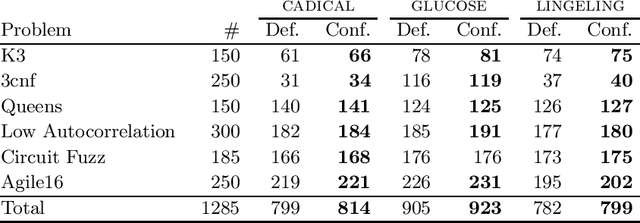

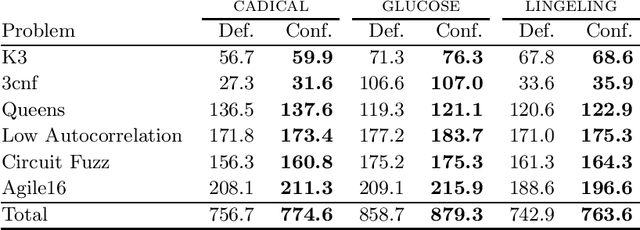
Abstract:The decoupling between the representation of a certain problem, i.e., its knowledge model, and the reasoning side is one of main strong points of model-based Artificial Intelligence (AI). This allows, e.g. to focus on improving the reasoning side by having advantages on the whole solving process. Further, it is also well-known that many solvers are very sensitive to even syntactic changes in the input. In this paper, we focus on improving the reasoning side by taking advantages of such sensitivity. We consider two well-known model-based AI methodologies, SAT and ASP, define a number of syntactic features that may characterise their inputs, and use automated configuration tools to reformulate the input formula or program. Results of a wide experimental analysis involving SAT and ASP domains, taken from respective competitions, show the different advantages that can be obtained by using input reformulation and configuration. Under consideration in Theory and Practice of Logic Programming (TPLP).
ValAsp: a tool for data validation in Answer Set Programming
Feb 19, 2022
Abstract:The development of complex software requires tools promoting fail-fast approaches, so that bugs and unexpected behavior can be quickly identified and fixed. Tools for data validation may save the day of computer programmers. In fact, processing invalid data is a waste of resources at best, and a drama at worst if the problem remains unnoticed and wrong results are used for business. Answer Set Programming (ASP) is not an exception, but the quest for better and better performance resulted in systems that essentially do not validate data. Even under the simplistic assumption that input/output data are eventually validated by external tools, invalid data may appear in other portions of the program, and go undetected until some other module of the designed software suddenly breaks. This paper formalizes the problem of data validation for ASP programs, introduces a language to specify data validation, and presents \textsc{valasp}, a tool to inject data validation in ordinary programs. The proposed approach promotes fail-fast techniques at coding time without imposing any lag on the deployed system if data are pretended to be valid. Validation can be specified in terms of statements using YAML, ASP and Python. Additionally, the proposed approach opens the possibility to use ASP for validating data of imperative programming languages. Under consideration for acceptance in TPLP.
Proceedings 37th International Conference on Logic Programming (Technical Communications)
Sep 15, 2021Abstract:ICLP is the premier international event for presenting research in logic programming. Contributions to ICLP 2021 were sought in all areas of logic programming, including but not limited to: Foundations: Semantics, Formalisms, Nonmonotonic reasoning, Knowledge representation. Languages issues: Concurrency, Objects, Coordination, Mobility, Higher order, Types, Modes, Assertions, Modules, Meta-programming, Logic-based domain-specific languages, Programming techniques. Programming support: Program analysis, Transformation, Validation, Verification, Debugging, Profiling, Testing, Execution visualization. Implementation: Compilation, Virtual machines, Memory management, Parallel and Distributed execution, Constraint handling rules, Tabling, Foreign interfaces, User interfaces. Related Paradigms and Synergies: Inductive and coinductive logic programming, Constraint logic programming, Answer set programming, Interaction with SAT, SMT and CSP solvers, Theorem proving, Argumentation, Probabilistic programming, Machine learning. Applications: Databases, Big data, Data integration and federation, Software engineering, Natural language processing, Web and semantic web, Agents, Artificial intelligence, Computational life sciences, Cyber-security, Robotics, Education.
An ASP-based Solution to the Chemotherapy Treatment Scheduling problem
Aug 25, 2021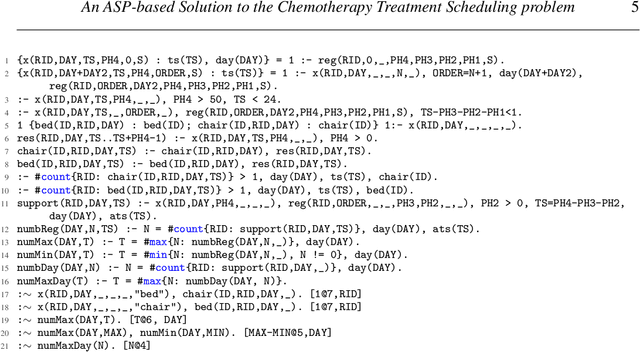
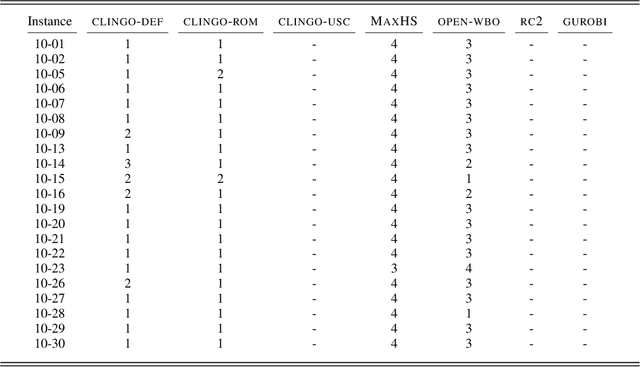


Abstract:The problem of scheduling chemotherapy treatments in oncology clinics is a complex problem, given that the solution has to satisfy (as much as possible) several requirements such as the cyclic nature of chemotherapy treatment plans, maintaining a constant number of patients, and the availability of resources, e.g., treatment time, nurses, and drugs. At the same time, realizing a satisfying schedule is of upmost importance for obtaining the best health outcomes. In this paper we first consider a specific instance of the problem which is employed in the San Martino Hospital in Genova, Italy, and present a solution to the problem based on Answer Set Programming (ASP). Then, we enrich the problem and the related ASP encoding considering further features often employed in other hospitals, desirable also in S. Martino, and/or considered in related papers. Results of an experimental analysis, conducted on the real data provided by the San Martino Hospital, show that ASP is an effective solving methodology also for this important scheduling problem. Under consideration for acceptance in TPLP.
Operating Room (Re)Scheduling with Bed Management via ASP
May 05, 2021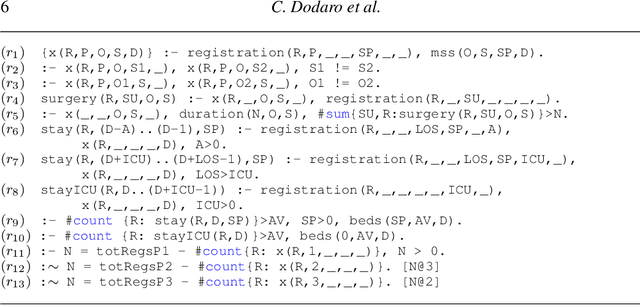


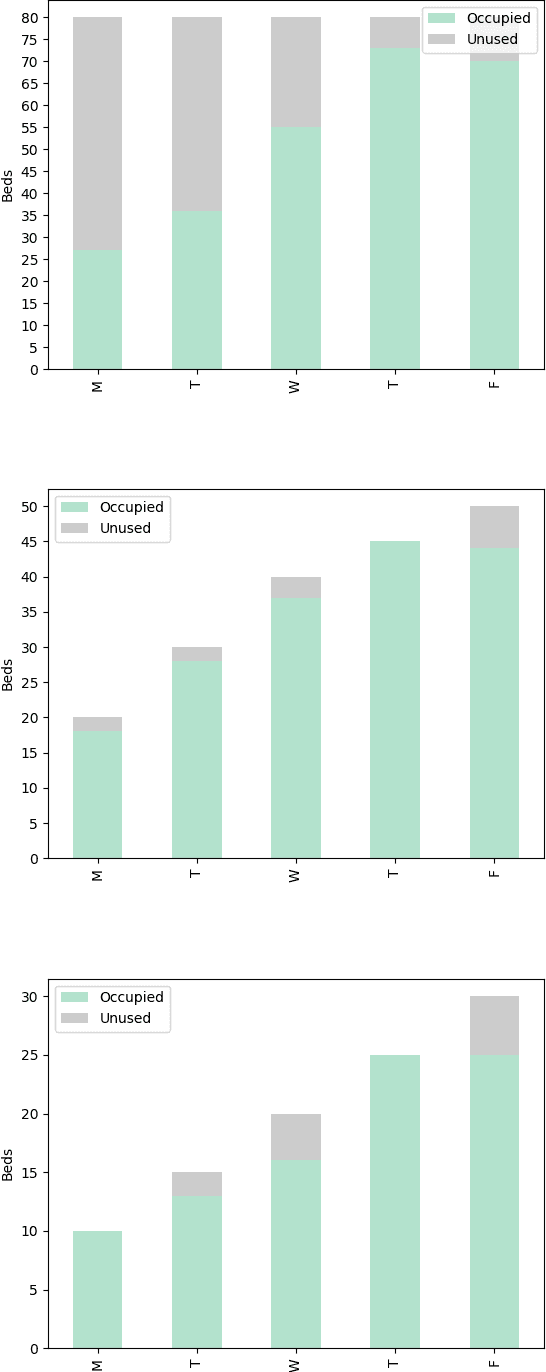
Abstract:The Operating Room Scheduling (ORS) problem is the task of assigning patients to operating rooms, taking into account different specialties, lengths and priority scores of each planned surgery, operating room session durations, and the availability of beds for the entire length of stay both in the Intensive Care Unit and in the wards. A proper solution to the ORS problem is of primary importance for the healthcare service quality and the satisfaction of patients in hospital environments. In this paper we first present a solution to the problem based on Answer Set Programming (ASP). The solution is tested on benchmarks with realistic sizes and parameters, on three scenarios for the target length on 5-day scheduling, common in small-medium sized hospitals, and results show that ASP is a suitable solving methodology for the ORS problem in such setting. Then, we also performed a scalability analysis on the schedule length up to 15 days, which still shows the suitability of our solution also on longer plan horizons. Moreover, we also present an ASP solution for the rescheduling problem, i.e. when the off-line schedule cannot be completed for some reason. Finally, we introduce a web framework for managing ORS problems via ASP that allows a user to insert the main parameters of the problem, solve a specific instance, and show results graphically in real-time. Under consideration in Theory and Practice of Logic Programming (TPLP).
 Add to Chrome
Add to Chrome Add to Firefox
Add to Firefox Add to Edge
Add to Edge